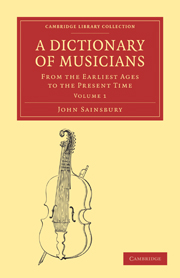Book contents
Summary
CACCINI, (Giulio, called also Giulio Romano.) He was born at Rome, but resided thirty—seven years at Florence. He was a celebrated scholar, and likewise a dramatic composer. Giulio Romano composed, in conjunction with Jacobo Peri, the opera called “Euridice,” which was produced on the occasion of the marriage of Henry IV. of France to Mary de Medicis, and acted at Florence in 1600. Dr. Burney considers “Euridice” to have been the first opera ever, performed in public, though primary attempts at dramatic music were probably made at an earlier period. Giulio Romano died in 1615. His most celebrated work was entitled “Nuove Musiche,” published at Venice just before his death.
CACCINI, (Francesca, called also La Cechina) daughter of Giulio Caccini, was for many years the admiration of Florence, not only for her musical abilities, both in singing and composition, but for her poetry, in the Latin as well as Tuscan languages. She flourished about the year 1640.
CADENZE, (Signora.) See Nicolini.
CAERWARDEN, (John) chamber-mucian to Charles I., was a celebrated teacher on the viol and a composer.
CÆSAR, (Dr. Julius) a physician of Rochester. Two good catches of his composition are published in the “Pleasant Musical Companion,” 1726.
CÆSAR, (William or Smegergill) a composer of songs, printed in “Playford's Musical Companion,” 1669.
CAFFARELLI, (Gaetano Majohano) a celebrated Italian singer, was the son of a peasant in the kingdom of Naples, and was born in 1703. He was the pupil of Porpora at the same time as Farinelli, whom he equalled in reputation and talent, though not in modesty.
- Type
- Chapter
- Information
- Publisher: Cambridge University PressPrint publication year: 2009First published in: 1824

